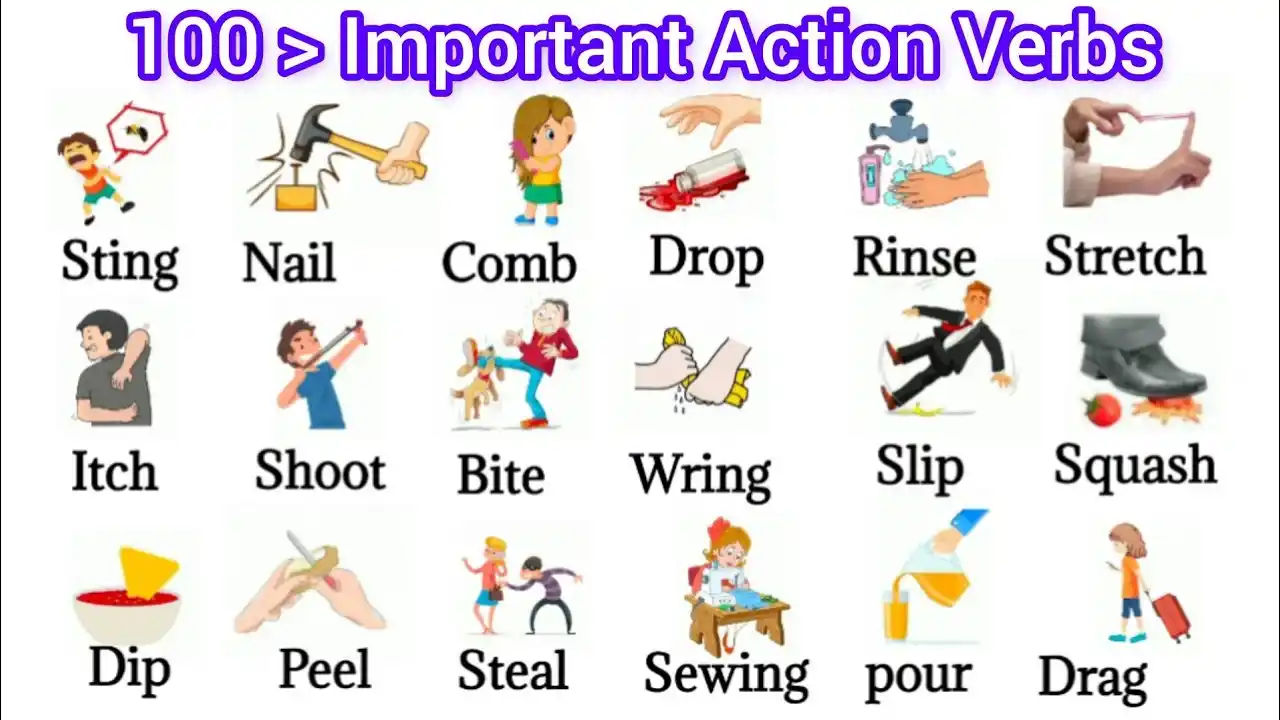100 Action Words in English: Boost Your Vocabulary (Free PDF)
Why Learn Action Words?
Action words (also called verbs) are the backbone of clear communication. They describe movement, thought, feeling, and more. Whether you’re writing, speaking, or preparing for exams, mastering these verbs boosts your fluency and clarity.
📥 Download: 100 Action Verbs PDF List
Want to save this list for offline use?
👉 100 Action Words In English of all 100 action words with examples.
🔤 What Are Action Words?
Action words express activities, movements, or states of being. Examples:
-
Run, write, create, decide, build, jump.
They help you make sentences dynamic and engaging.
📚 List of 100 Common Action Words in English
Here’s a categorized list of verbs for easy memorization:
Physical Actions
- Jump
- Run
- Push
- Pull
- Lift
- Carry
- Sit
- Stand
- Walk
- Climb
Mental Actions
- Think
- Decide
- Imagine
- Consider
- Forget
- Analyze
- Dream
- Understand
- Guess
- Focus
Communication Actions
- Speak
- Say
- Whisper
- Shout
- Explain
- Ask
- Answer
- Call
- Talk
- Respond
Daily Routine
- Wake
- Eat
- Drink
- Work
- Sleep
- Bathe
- Dress
- Cook
- Read
- Clean
Emotional Verbs
- Love
- Hate
- Enjoy
- Feel
- Cry
- Laugh
- Worry
- Relax
- Hope
- Fear
Learning & Creativity
- Learn
- Teach
- Draw
- Paint
- Sing
- Dance
- Write
- Build
- Invent
- Design
…and many more in the full PDF!
✍️ Example Sentences Using Action Words
- Run: She runs every morning to stay healthy.
- Think: I need time to think about the offer.
- Teach: He teaches math at the local school.
- Build: They built a treehouse last summer.
- Laugh: The baby laughed loudly.
Tip: Use action verbs in every sentence to sound more natural and confident.
🎯 How to Improve Your Vocabulary with Action Verbs
- Read English books and underline verbs.
- Use new verbs in your sentences.
- Practice with a friend or language partner.
- Download the PDF and revise it daily.
🔗 Related Resources
- 50 Describing Words with Examples
- Adverbs to Use with Action Verbs
- English Grammar for Beginners
📷 Visual Learning Aids
- A featured image (e.g., a visual list of the top 10 action verbs).
- An infographic showing categories of verbs.
- A short YouTube explainer video for pronunciation practice.
🧠 Did You Know?
Action verbs not only improve writing—they also make your speaking more confident, persuasive, and clear.
📱 Mobile Optimization Tip
Use buttons for PDF download, ensure headings are properly spaced, and avoid small fonts or large blocks of text.
🏁 Conclusion
Learning 100 action words in English is a simple way to strengthen your communication. Download the free PDF, use the examples daily, and expand your vocabulary one verb at a time!
👉 Explore More Grammar Topics
Months Name
The month’s name refers to the twelve divisions of the year, each with its unique characteristics. January marks the beginning of the year, followed by February, the shortest month. March brings spring, while April is known for its showers. May blooms with flowers, leading into the warm days of June. July and August are the peak summer months. September heralds the arrival of autumn, followed by October, famous for Halloween. November is a time for gratitude, leading to December, which wraps up the year with festive celebrations. Each month offers distinct experiences, enriching our lives throughout the year.






[…] 100 Action Words in English […]